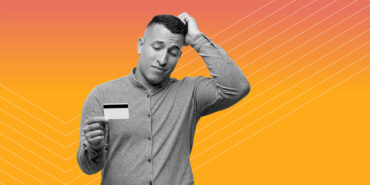Is No Credit Worse Than Bad Credit?

No loan? No credit card? That’s a good thing, right?
Well, maybe not.
Without a history of credit use, it is difficult to demonstrate how you handle debt. This means that lenders will likely be skeptical when you apply for a credit card or loan.
On the other hand, having bad credit means that you do have a record of credit use, and it doesn’t look good. To lenders, you appear risky and they will think twice before approving your credit application or offering an optimal interest rate.
While neither no credit nor bad credit is good, having no credit is generally considered easier to fix. However, there are remedies for bad credit, too.
Ready to take control? Here’s what you need to know to get started.
Is no credit worse than bad credit?
Maybe not, but it’s not great.
No credit means you don’t have any activity on your credit report. You’ve probably never taken out a loan or signed up for a credit card. The result is a clean, but bare, credit report.
This isn’t necessarily bad. Lenders generally won’t hand out credit to people who are deemed risky — and with no credit, it’s hard to make a case for your creditworthiness. However, you can build a positive history of credit use by opening an account and consistently making on-time payments.
With bad credit, on the other hand, your credit report is marked with mishaps — missed payments or loan defaults for example. These black marks stay on your report for up to seven years and weigh you down, even if your recent credit use is responsible.
Typically bad credit is considered harder to overcome than having no credit. With bad credit, you’re in the red, and healthy credit behaviors need to offset past mistakes. No credit is essentially a blank slate; it makes you a risk, but responsible credit use will create a track record in your favor.
Why is it bad to have no credit history?
A credit report is essentially your financial resume. It’s a way to predict how likely you are to pay back money. In the same way that an employer probably wouldn’t hire someone without job experience, most lenders won’t lend to people without a credit history.
If you’ve never had a credit card or other form of debt, there’s no evidence to show that you can be trusted to make your payments. No evidence means uncertainty. Uncertainty means there’s a chance that you’ll miss payments and default. A chance that you’ll default means the lender won’t receive their money, at least without taking action.
No credit history can be overcome by establishing a track record of responsible credit use. Until then, lenders will be reluctant to extend credit at the best rates, or at all.
How can I build a short credit history?
There are several ways to start building credit from scratch.
First, look into signing up for a secured credit card. A secured credit card relies on money you pay upfront into an account as collateral. This cash deposit will allow you to purchase items on credit and pay it back later, up to a limit. Use the card sparingly and pay it off in full every month to build up your credit score.
If you are close to someone who has a good credit score, you can check with them if they will let you become an authorized user on one of their credit cards. You don’t have to use their credit card to benefit from their positive financial behavior. However, if you do, remember to pay off all your purchases on time, or both of your credit scores could be on the line.
You can also take out a credit-building loan from a bank or a responsible lender. These kinds of loans should be used purely to build credit, not to buy the latest electronic gadget or dream vacation. Borrow the money, stash it away in a savings account, and use that to pay it back month by month.
Finally, make sure you follow healthy credit practices. For instance, pay your bills on time and in full. Late payments on anything can tank your credit before it even gets off the ground. Remember that carrying a balance month-to-month can increase your utilization rate, which should ideally stay under 30%, not to mention the interest and fees.
What's my credit score if I have no credit?
No credit doesn’t mean you have a credit score of zero. In fact, that’s impossible. The FICO scoring system produces credit scores between 300 and 850.
A credit score is the result of the following factors:
- Payment history (35%)
- Total amount owed (30%)
- Credit history (15%)
- New credit (10%)
- Credit mix (10%)
If you have no credit, you don’t have a score.
Do I have a credit score if I never had a credit card?
Maybe. Maybe not.
A credit card isn’t the only way to build a credit score. If you’ve never owned a credit card, you may have a score based on other forms of credit you used in the past, such as a student loan or personal loan. There are ways to build credit beyond using a credit card.
If you’ve never had any form of credit, you likely don’t have a credit score.
What's the fastest way to build credit?
We spoke to Tony Matheson, a wealth advisor and founder of Slalom Wealth Management, about ways that consumers can start building credit, or in some cases, rebuilding credit.
No. 1: Secured credit card
Opening a secured credit card is a low-risk option for consumers with low or no credit to start building credit.
A secured credit card is backed by collateral funds, which ensure the financial institution receives payment, Matheson said. This helps lessen the liability of lending to people without a credit history.
No. 2: Gas and store credit card
Establish credit by taking out a credit card with a gas company or retail store.
“These places often have lower credit score thresholds required for approval,” Matheson said. “If you are spending money there already, you may as well utilize this opportunity to build your credit.”
No. 3: Utility bills
Typically utility bills are left out of consumer credit reports, but new companies are helping customers make these on-time payments count.
“Simply setting up an account for your cell phone, cable TV, or the electricity company can begin to establish a track record of making payments on time,” Matheson said.
Bottom line
No credit isn’t necessarily worse than bad credit, but it’s still not great. The good news is that it’s not too late to start building credit the right way.

Tony Matheson CFP® is a wealth advisor and founder of Slalom Wealth Management He specializes in helping solve the financial challenges often faced by sales professionals.




